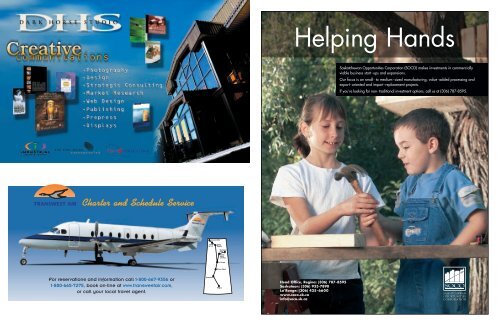Download PDF - the Commuter
Download PDF - the Commuter
Download PDF - the Commuter
You also want an ePaper? Increase the reach of your titles
YUMPU automatically turns print PDFs into web optimized ePapers that Google loves.
The Day Wìsakecak Came to Our School<br />
WRITTEN BY DON FREED AND GRADE 5, PLEASANT HILL COMMUNITY SCHOOL, SASKATOON, 1998<br />
The day Wisakecak came to our school<br />
He played <strong>the</strong> Trickster and he played <strong>the</strong> fool<br />
Everybody laughed and had some fun<br />
And we felt much better when <strong>the</strong> day was done<br />
We were playing outside on <strong>the</strong> first day it snowed<br />
His apparition came down <strong>the</strong> road<br />
He stood <strong>the</strong>re grinning like a glad surprise<br />
We could hardly believe our eyes<br />
Chorus:<br />
Oh! Oh! Wisakecak<br />
Astum Othé make us glad<br />
The day you came to our school<br />
Was <strong>the</strong> most fun we ever had<br />
He came from <strong>the</strong> North on a big brown bear<br />
In a beaded coat with fea<strong>the</strong>rs in his hair<br />
He took his drum and began to pound<br />
Children started dancing all around<br />
Then he slipped and he fell on his behind<br />
We started laughing and he didn’t mind<br />
The school bell rang and we had to go<br />
He followed us in on his tippy-toe<br />
-Chorus-<br />
We all were wond’ring what he would do<br />
Would he get into trouble and <strong>the</strong> rest of us too?<br />
He went and he talked to <strong>the</strong> teaching staff<br />
Saying, “Kids feel better when you make <strong>the</strong>m laugh!”<br />
Then he walked right by us and he went outside<br />
He turned into a Raven with his wings spread wide<br />
He dropped one fea<strong>the</strong>r <strong>the</strong>n he flew away<br />
Saying, “Learn your lessons ... I’ll come back someday”<br />
Wisakecak is Cree for <strong>the</strong> trickster or joker.<br />
Astum Othé means “come over here”.<br />
Don Freed would like to thank: Saskatchewan Education, Canada Council For The Arts, Saskatchewan Health, F.K. Morrow Foundation,<br />
National Aboriginal Achievement Foundation, Associated Entities Fund and The Muttart Foundation.<br />
she haunts Old Mission Hill/But<br />
why should we be scared/Of a soul<br />
who really cared?’<br />
“My original intention was to have<br />
<strong>the</strong> kids write <strong>the</strong>ir own songs and<br />
I have stuck to that,” Freed says. He<br />
calls <strong>the</strong> process draining but satisfying.“Kids<br />
today are used to <strong>the</strong><br />
fast edit speed of television and<br />
video games, so <strong>the</strong>ir attention is<br />
not easy to hold.And I can’t be a<br />
disciplinarian, I have to give <strong>the</strong>m<br />
room to create. Sometimes it’s pandemonium.<br />
By <strong>the</strong> end of <strong>the</strong> day,<br />
after I’ve been in four or five classrooms,<br />
I’m brain dead.”<br />
His commitment to <strong>the</strong> project has<br />
not wavered, though when he<br />
started, he did not know he was<br />
beginning a ten-year marathon – or<br />
that <strong>the</strong> journey would become an<br />
end in itself. He has been places<br />
most people never see, like<br />
Wollaston Lake and Stony Rapids,<br />
which are so far north <strong>the</strong>y are<br />
only accessible by air; and Dillon<br />
and Sandy Bay, which are literally<br />
<strong>the</strong> last stop on <strong>the</strong> road.<br />
His travels have deepened his interest<br />
in his own Métis heritage,<br />
which came as a revelation in 1989<br />
when he attended <strong>the</strong> funeral of<br />
great aunt in Duck Lake.“I discovered<br />
<strong>the</strong>n that two of my greatgreat<br />
grandfa<strong>the</strong>rs had actually<br />
been indicted with Louis Riel and<br />
that my great-great uncle by marriage<br />
was Gabriel Dumont.”<br />
Discovering his own roots streng<strong>the</strong>ned<br />
Freed’s determination to give<br />
nor<strong>the</strong>rn aboriginal kids a voice.<br />
“Music has a way of opening kids<br />
up. I can tell you why. For thousands<br />
of years, people have been<br />
sitting around campfires telling stories<br />
and singing songs.Those songs<br />
reflect your culture, your world.<br />
That’s <strong>the</strong> energy we re-ignite in<br />
<strong>the</strong> classroom. It’s a tool that goes<br />
right to <strong>the</strong> spirit.”<br />
Over <strong>the</strong> years, Freed has produced<br />
several albums to showcase <strong>the</strong><br />
young singer/songwriters.The culmination<br />
of <strong>the</strong> project came with<br />
<strong>the</strong> December 2001 release of Our<br />
Very Own Songs, a double CD set<br />
containing 43 original songs written<br />
and performed by more than<br />
1,000 aboriginal school-age children<br />
in 30 different communities.<br />
There’s an accompanying songbook<br />
and website at<br />
www.ourveryownsongs.ca .<br />
Freed sent <strong>the</strong> CD to <strong>the</strong> Toronto<br />
CBC music distribution room. He<br />
was excited when, within days,<br />
<strong>the</strong>y called back and asked for<br />
more copies to send to stations<br />
across <strong>the</strong> country.“ They get hundreds<br />
of submissions a day.What that<br />
call said, in essence, is that we think<br />
this deserves to be heard by everyone.”<br />
The ultimate goal is to get Our Very<br />
Own Songs into elementary schools<br />
and public libraries across Canada.<br />
While Freed continues making<br />
inroads in marketing, he’s also<br />
exploring new directions in his own<br />
life. Right now, he’s in Winnipeg<br />
recording a CD of his own material<br />
and writing a new play.<br />
“It’s time to let <strong>the</strong> songs go,” he<br />
says.“They need to weave into <strong>the</strong><br />
schools, into <strong>the</strong> community and<br />
become part of <strong>the</strong> culture. It’s <strong>the</strong><br />
only way <strong>the</strong>y can take root.”<br />
But he’s not done with <strong>the</strong> north or<br />
with nor<strong>the</strong>rn kids.“I’ll definitely<br />
go back. I’m addicted. I’ll do this for<br />
as long as I am able.”<br />
Let’s hope that day is far away,<br />
after Freed has taught a generation<br />
of nor<strong>the</strong>rn children to find <strong>the</strong>ir<br />
own voices … <strong>the</strong> way he’s found<br />
his own.


